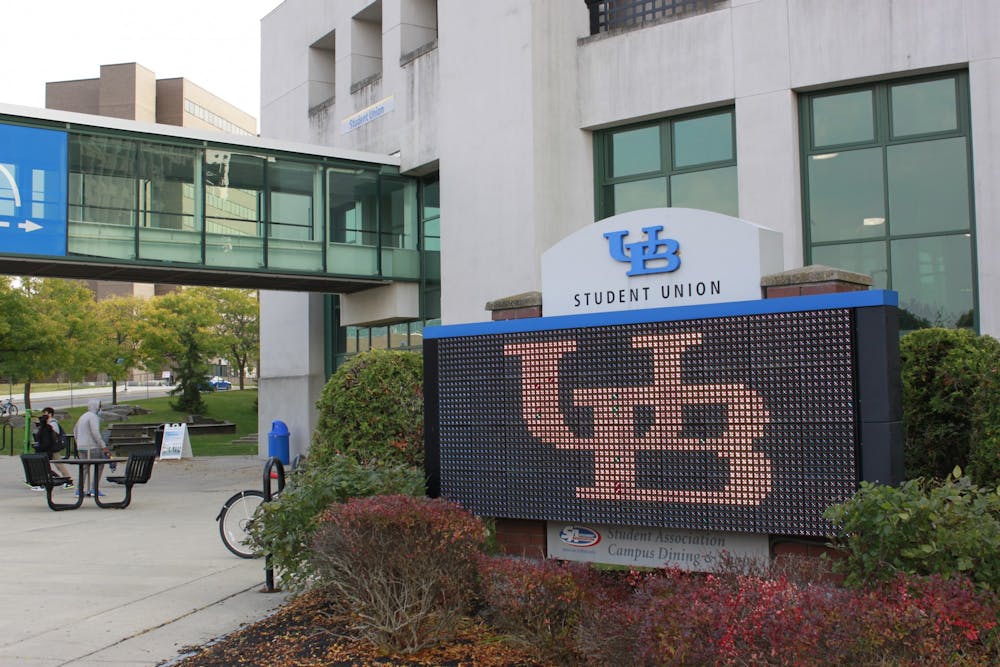Refunds, revenue losses and state budget cuts due to the COVID pandemic have caused financial hardships for colleges nationwide.
UB is no exception.
President Satish Tripathi sent an unprecedented email to the UB community Monday night outlining the dire financial shortfalls the university faces as a result of the pandemic. The email blames a 25% reduction in state funding and $19.2 million in withheld NYS funds as major contributors to UB's current cash-strapped circumstances. It also cites $27 million in lost revenue for housing and dining, a $5 million loss in tuition from international students and $32 million in added costs from “unanticipated refunds” and expenses related to learning during the pandemic.
The email doesn’t explain how the cuts will affect students and faculty or what programs or departments will face deficits. Deans, it says, will need to cut their units by at least 10% for the 2020-2021 academic year. Close to $900,000 in Excelsior scholarship funds have also not arrived from the state, Tripathi wrote, leaving the fate of needy students uncertain.
The email doesn’t mention UB’s $798 million endowment or how those funds might be tapped to offset the deficit.
This is the first time UB students have received an email detailing UB's financial challenges since the pandemic shut down the campus in March. Tripathi, in his email, explained administrators' decision to inform the UB community about how the pandemic's “financial consequences” will affect UB.
“As we all know, the COVID-19 pandemic has created serious economic and financial consequences across the world, the nation and here at home in New York State,” Tripathi wrote. “It is important that we have a shared understanding of these challenges and how we are addressing them.”
UB established the Strategic Financial Management Advisory Group last semester to help guide the university’s financial plans, Tripathi said. The group, which consists of 27 administrators, faculty and staff, is headed by Provost A. Scott Weber and Vice President of Finance and Administration Laura Hubbard.
“This committee—comprised of individuals who represent interests and perspectives across the university—has been charged with exploring and advising on strategic financial plans that account for potential revenue and spending changes in the current academic year,” he wrote.
The email doesn’t state how the committee will help UB fulfill its academic obligations or ensure faculty can pursue planned research.
To help offset costs, the university has instituted a hiring pause, reviewed planned projects and contracts and negotiated more favorable payment terms on them.
“Overall, these efforts have enabled UB to reduce expenditures by 22.8% from the previous fiscal year, starting from the first quarter of the current fiscal year,” he wrote.
But, still, the state’s budget deficit will have dire effects on SUNY and UB. “Currently, SUNY is projecting our reduction in direct state tax support revenue to be in the range of 20% to 25%, or approximately $30-$40 million. This is on top of the $19.2 million due to UB for last year,” he said.
Last semester, UB refunded 26,000 students for dorms, dining and broad-based fees which totalled to $27.15 million. Additionally, UB spent approximately $3.1 million on COVID- related costs, such as personal protective equipment, cleaning supplies and technology for online learning. UB received $24 million in federal aid through the CARES Act., half of which was used as emergency financial grants to students impacted by COVID. The rest went to offset the costs of refunds.
Tripathi singled out negotiated salary increases, which are no longer being funded by the state, as a “most pressing” long-term financial concern.
“Two years ago, the funding of one-time retroactive costs associated with the new contract helped offset some of the immediate impact,” Tripathi said. “However, we estimate that the new contract will cost UB $50 million in recurring funds when fully executed.”
The $50 million, including the $30.6 million collected from the last negotiated salary contract, will bring the university’s total spending to at least $81 million recurring with no increases in recurring sources.
Tripathi wrote in the email that administrators are keeping student costs low by choosing not to increase UB's tuition or the academic excellence fee. UB's comprehensive fee, however, went up by 2.03% and changes to the fee waiver policy have made it more difficult for students to claim the waiver.
Tripathi does point out that UB was financially strong before the pandemic and, at the end of the 929-word letter, expressed hope in the integrity of the university.
“While these financial challenges are daunting, I have every confidence that we can emerge from this crisis and persist unabated in our mission-driven priorities. In this way, we will continue to have a transformative impact on the communities we serve,” Tripathi wrote.
Vindhya Burugupalli is the senior engagement editor and can be reached at vindhya.burugupalli@ubspectrum.com or on Twitter @vindhyab_

Vindhya Burugupalli is the engagement editor for The Spectrum. She loves traveling and documenting her experiences through mp4s and jpegs. In her free time, she can be found exploring cute coffee shops and food spots.





